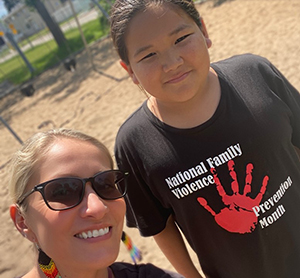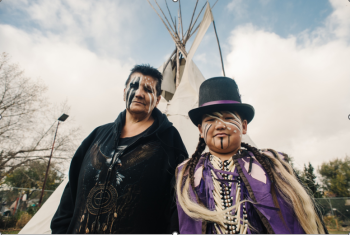Image Caption
Summary
Local Journalism Initiative Reporter
Windspeaker.com
When 13-year-old Noah Green sings, the world stops to listen.
Noah sings alongside his grandmother Carol Powder as the Edmonton-based hand drum duo Chubby Cree.
Award-winning filmmaker Dr. Jules Arita Koostachin has documented their journey, their relationship, and the power and impact of Noah’s voice.
Koostachin’s new film called Chubby Cree: PiMahCiHo Win (The Journey) premieres Friday, Oct. 13 on Telus Optik channel 8, and will stream worldwide at Telus originals at https://watch.telusoriginals.com/
Celebrating positivity, love and hope, PiMahCiHo Win is not necessarily a physical journey, explained Koostachin. “It's also the journey of life and the journey of passing on tradition and culture.”
To improve their mental and emotional well being, young audiences and families need to see positive representations of themselves, Koostachin said. “They need to see this young role model who carries medicine in his voice.”
In 2019, Chubby Cree performed when environmentalist Greta Thunberg spoke to 5,000 people in front of the Alberta legislature in Edmonton. More than a million people have viewed the video of then 10-year-old Noah singing Rock Your World, which showcases his powerful voice. Rock Your World has since been professionally recorded by Noah a number of times. Here's a link on YouTube https://youtu.be/OsniojX1lds?si=GuhvzgelYCfI8xdF
Noah says that power comes “from the Creator.”
Powder never expected their singing to have that type of impact.
“We thought we're just going to go out there and make people happy.”
Noah was a singer from the very start, Powder said. While she had sung Plains Cree and Stoney language songs to all her children, he started humming along early, at eight months old. Koostachin includes family videos of a small Noah nodding and singing, the beginning of the duo. Noah was two years old when he first sang on stage.
In the film, Powder said she was five years old when her 99-year-old great grandfather Harry Powder sat with her. He told her, ‘When you grow up, you’re going to be a singer. And the reason why we want you to be a singer is so you will bring back women to the drum, because when the women drum and sing with kids, that’s the only time anyone’s going to heal’,” he told her.
When Carol and Noah stepped out to sing for the first time, Carol was determined to sing for all her grandkids.
“I don't know what the outcome's going to be,” she thought. “Maybe people throw rocks at us, kick dirt at us and maybe people will heal from us.”
When Noah was six years old, he began to see the impact his voice had on people, hearing their cheers and seeing them crying.
“‘How come?’ he would ask. ‘Why is that person crying?”’ recalled Powder, so she explained. “Well, when you sing, Noah, you’ve got this power in your voice.”
“I told him the ancestors—my grandparents, their grandparents–they're coming through you and us.”
Powder’s grandfather and great grandfather were medicine men, she explained. “A lot of good healers in our family,” Powder said.
“They came through me, to come to you,” said Powder. “They're here from the next world helping you to help these people, to bring them back to something they might have forgot, or they might forget who they were, because of the government taking them away…”
The sharing of songs and culture is what motivates Chubby Cree to keep working, practicing, and travelling.
“We do it to inspire people so they can come back to the drum, especially women and kids,” Powder said. “Noah's generation is the generation,” said Powder. “Our generation is not teaching the next generation. So they're missing out and they don't know their culture. We want to inspire them to teach their kids.”
Noah says he feels like his ancestors are listening to him, and he has felt them close.
“One time, when I was singing, I could hear someone sing right beside me.”
Powder raised him from birth, along with many of her grandchildren. Similarly, Powder was raised by her grandparents.
“They're the epitome of that traditional familial structure. They are that extended family where everybody contributes,” said Koostachin.
The film shows how culture is key for the grandmother, “so she is doing what the matriarch does. She is passing on tradition,” says Koostachin.
“I just want to make sure my grandkids know who they are, and are proud of their culture,” Powder said.

Chubby Cree: PiMahCiHo Win shows Powder as a culturally connected and active community member, “so that those kids are going to be able to walk a good life. They're just super strong,” said Koostachin, explaining she was close to her grandmother in the same way. Grandmothers holding families together is another theme rippling through the film.
Koostachin’s lens captures the strong bond between Noah and his grandmother, showing them together at home and sharing the stage.
Through conversations and interviews, Koostachin quickly realized the story was “not just about Noah. It's about that relationship between Noah and grandmother,” the filmmaker said.
“There's a deep, deep connection between the two of them—and it’s unbreakable,” said Koostachin started meeting with Chubby Cree in 2020 when producer Nick Orchard of Soapbox Productions Inc. reached out to her.
For Koostachin, choosing a subject for film is all about if she feels connected to the story and if her heart is in it.
Koostachin explained the different ways she approaches a project as an InNiNew IsKwew (Swampy Cree woman).
“The methodology is different. The stakes are higher for us because we're held accountable by our community. Outsiders are not,” Koostachin said. “It's a very different method in terms of interviewing and research and working in community.”
Connecting with Noah was a matter of sitting with him like his grandmother does, so the film shows the director and singer sitting at the park, getting to know each other. Filming days happened while take Noah and her own son to have fun with go-carts and ice cream.
Including a lot of singing in the film was an intentional choice so audiences could hear Noah’s voice.
“I want to see them be in awe when they hear that little boy sing. I just want them to walk away feeling good.”
The film was an opportunity to share a positive representation of Indigenous culture in the film. “We have a lot of sad stories out there, and that's okay. We have to speak our truth. We don't want to censor anyone,” said Koostachin.
“But I also think there's room for these light family stories of celebration.”
Powder shares her hopes for the film, and for her grandson.
“I hope he continues to do this until he's an old man,” she said. And continues in the teachings he’s being raised in.
“I hope he continues to teach his grandchildren so they can keep going and going.”
When asked if he’s going to keep singing his whole life, Noah says, “Yes, for sure.”
Windspeaker is owned and operated by the Aboriginal Multi-Media Society of Alberta, an independent, not-for-profit communications organization.
Each year, Windspeaker.com publishes hundreds of free articles focused on Indigenous peoples, their issues and concerns, and the work they are undertaking to build a better future.
If you support objective, mature and balanced coverage of news relevant to Indigenous peoples, please consider supporting our work. Whatever the amount, it helps keep us going.

